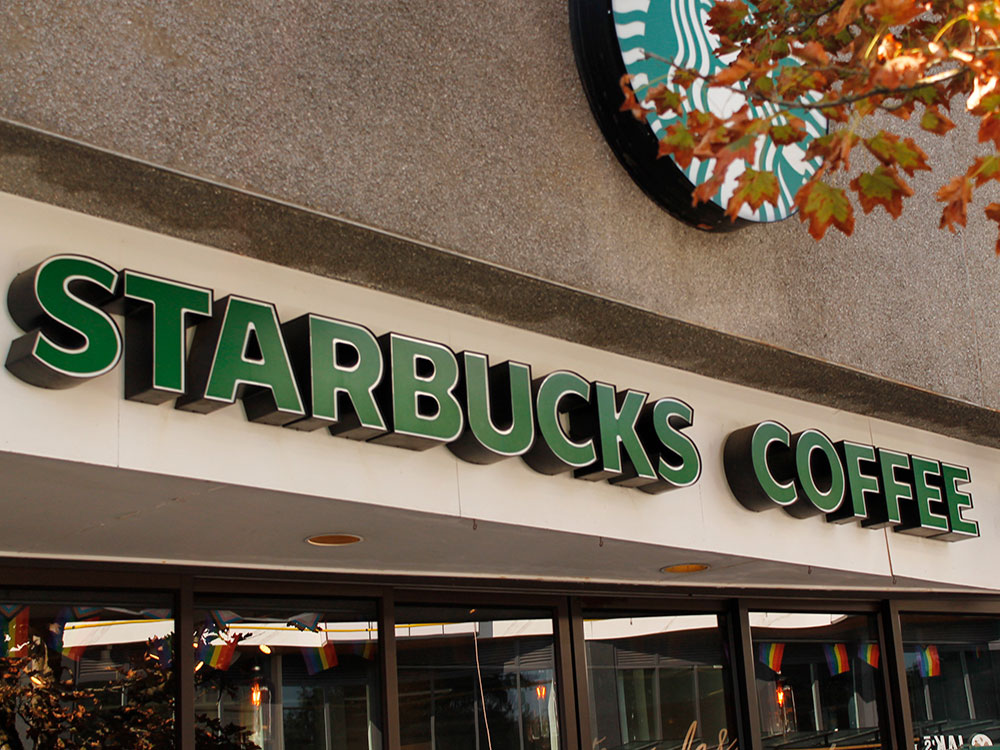Starbucks employees at two of the company’s British Columbia locations have endorsed a strike as they attempt to negotiate a first contract.
Baristas at Starbucks’ Clayton Crossing in Surrey and Valley Centre in Langley this week voted 91 per cent in favour of walking off the job.
Alex Filali, a shift supervisor at the Clayton Crossing location, said she and her colleagues have no immediate plans to stop work or picket the affected locations.
But she’s hopeful the company will return to the table — and if not, she says the pumpkin spice lattes will stop flowing.
“Nobody wants to strike. We are trying to get something better, here,” Filali said. “But if that’s what it leads to, I’m willing.”
Filali and co-workers at Clayton Crossing — which the union says is one of the busiest Starbucks locations in Western Canada — voted in 2022 to join United Steelworkers Local 2009.
The Valley Centre location voted to join the union in the same year and the two have been jointly bargaining with Starbucks for a first contract since January.
But Filali said the slow-moving negotiations hit a sticking point over shift scheduling and wage increases.
The two parties reached an impasse at the bargaining table earlier this month and the roughly 50 employees at the two stores backed a strike mandate in a vote on Saturday and Monday.
Filali said the union would be open to mediation.
Starbucks did not answer any questions about its proposal at the table or whether it would entertain mediation.
Spokeswoman Carly Suppa said in a provided statement that the company "is committed to progress negotiations towards a first contract, and we continue to approach the bargaining table in good faith."
The union says it asked Starbucks for a three-year contract including six-per-cent general wage increases in 2023-24 and 2024-25.
Workers already received a six-per-cent increase for this fiscal year, Filali said.
Filali said Starbucks was not willing to entertain similar increases.
“It was shock and an almost immediate no,” she said. She said the company’s last offer was for 2.5-per-cent wage increases in 2023-24 and 2024-25.
“They offered us essentially what we were already getting,” she said.
Filali said baristas also wanted scheduling tied to seniority and more control over when they worked.
Starbucks schedules employees via an algorithm, Filali said, based on when employees are available and when demand is highest.
That leads to heavy hiring and scheduling in the fall and winter and a lull in the warmer months, meaning employees often don’t know how many hours they will work and how much pay they will take home.
Filali said many of the staff, like her, are students and want to be able to adjust their work hours throughout the year. But the variation in hours makes it difficult to budget, she said, and also means they sometimes risk falling below the 20-hour-per-week quarterly average they need to be eligible for health-care benefits.
“For me, at least, being able to adapt my schedule without being reduced to being unable to pay rent is super vital as a student,” Filali said.
Starbucks locations across North America have unionized in recent years in a bid to improve pay and working conditions.
But organizers and observers in British Columbia say the company has sought to slow and stop unionization efforts through protracted bargaining and tough tactics.
In B.C., Starbucks recently gave a six-per-cent raise to all employees in the province except workers at three stores represented by USW 2009. The union argued at the BC Labour Relations Board that the company’s actions was an unfair labour practice. The company later agreed to pay those stores the raise retroactively.
Starbucks also recently decided to shutter its Dunbar Street location in Vancouver just months after workers there voted to join USW 2009.
The company said it was a business decision related to the expiry of a lease and not the store’s union status. The union says it is still waiting on documents from Starbucks about that decision, but does not have any evidence to suggest the closure was related to the store’s unionization.
Filali was the lead organizer of the union drive at the Clayton Crossing Starbucks. She has worked at the location for eight years, she said, and enjoys the fast-paced environment and the camaraderie of her colleagues. “Honestly, I’ve never worked at a place where I like the co-workers more. We are very busy but that means we tend to bond over it,” she said.
She says the goal of the union’s push is to get a contract that makes working at the store viable in the long-term.
“You’re not going to find the people you need if you don’t treat us as people,” she said. ![]()
Read more: Rights + Justice, Labour + Industry

















Tyee Commenting Guidelines
Comments that violate guidelines risk being deleted, and violations may result in a temporary or permanent user ban. Maintain the spirit of good conversation to stay in the discussion and be patient with moderators. Comments are reviewed regularly but not in real time.
Do:
Do not: